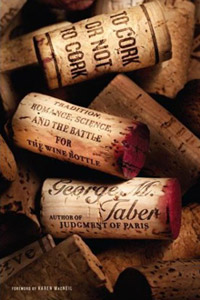The subtitle was mildly misleading, "Tradition, Romance, Science, and the Battle for the Wine Bottle" led me to believe it was more than just about corks and other wine bottle enclosures. But I was wrong. This is a 288 page book about methods of keeping wine in wine bottles and the history, science and controversy associated therein.
I had not realized that corking wine bottles was such a huge deal in the wine industry, before this book I had assumed it was simply the most convenient and cheapest way to keep the bottles sealed, with a little bit of tradition thrown in. I learned of cork's interesting cellular properties of letting the wine breathe without absorbing the wine itself.
I also learned that cork is only grown in Portugal, and that cork trees can only be harvested every ten years which seems like an incredibly inconvenient way of doing things If you have a bad harvest you have to wait another ten years to try again not to mention starting a cork orchard is a ten year investment before you can even begin to recoup the initial startup costs. But yet this is how the wine world works.
Cork can also taint the wine, giving it a "corked" taste that can be tasted even in such low quantities as several parts per trillion and can ruin an entire bottle of wine. Scientists pinpointed the chemical culprit as 2,4,6-trichloroanisole, otherwise known as TCA. The presence of TCA is a major controversy point in the wine world, with traditional cork makers insisting on winemakers still using corks, but they don't have much of an argument besides the fact that it is traditional to use cork stoppers.
Synthetic corks and screw tops have been trying to gain a foothold in the market for several decades, but wine culture still insists that a real cork is the most traditional and classy way of sealing wine bottles and synthetic corks and screw tops are considered "cheap" and "low class". Despite the negative cultural views on non-cork closures, they are actually better for wine since they do not depend on Portugal having a good growing season, and decrease the risk of TCA getting into the wine. A wine cannot be "corked" if it doesn't have a cork to begin with.
There are still some downsides to synthetic and non-cork closures. A stelvin (screw top) cap does not let the wine breathe at all, which can be a negative quality for wines that are meant to be aged. Synthetic closures also come with their share of chemically tainting the wine, but not to the degree of TCA.
Ultimately, the decision to cork or not to cork comes down to the individual winemaker and whether they wish to be seen as progressive or traditional.
Reading this book was somewhat interesting, but Taber can be longwinded at times and I could only read about cork vs non-cork for so long at a time. After the first few chapters he seemed to start repeating himself with slightly different arguments and points of view. The subject matter was interesting and something I had no clue about before, since before I read this book I had also assumed that a screw cap wine bottle meant that it was a cheap wine. I had assumed that the traditional bottle and cork was the most effective way of packaging wine, I didn't realize that it was mostly due to tradition because that's the way people had always done it and no one had really bothered looking into changing it until recently.
To Cork or Not To Cork relates to this class because it exposes that what is traditional is not always the best way of going about doing things. It helps enforce that it's okay to try things that are out of the ordinary and that progressive wines are not always bad and traditional established wines aren't always the best. It encourages trying wines that may appear "cheap" and "low class" that may turn out to be good wines, finding wines that appeal to you is more important than what tradition and culture dictate should appeal to you.

No comments:
Post a Comment